Dexter was purchased as a puppy. He was a pure breed Brittany spaniel. We fell in love with him immediately. We lost an elderly dog the year before, and had to put to sleep a rescue dog we had saved. We were devastated by it. We put our love into Dexter.
He quickly became part of the community because we live in a small mountain town. On the way to school, children stop to pet him. He was christened after a local creek.
Dexter was involved in a terrible accident when he was just a baby. We believe he caught the scent of a deer trail after escaping from our yard. He ran in front of the car.
Tim found him with his legs broken. Tim is a mountain rescue volunteer. I was told to come quickly. When I saw my baby I was horrified. Dexter was in a lot of pain and it was worse than I had thought. We knew we needed to get him to the vet, but there wasn't a moment to lose, as the closest one was an hour's drive away.
Dexter wanted to live, it was obvious. He rested his head on my lap while sitting in the back of the car. The vet was waiting for us when we arrived. He wanted the senior vet. We had no idea if Dexter had a brain injury. We had to amputate his right front paw, but the left could be saved, since it wouldn't be fully functional. We were going to do everything we could to save Dexter.
Dexter came back after three days. The vet thought he could enjoy a good quality of life after a lot of surgeries. It took him a long time to recover and I worked hard on his rehabilitation. For a year, Dexter had to wear a cone, and we had a specially commissioned wheelchair that fit around his stomach, with wheels at the front, so he could get around on three legs. He had a lot of energy and was positive.
I would take him down the porch steps without his wheelchair to go outside. I left him at the bottom so I could get my coffee. Dexter was at the top of the stairs when I came back. I was dumbfounded by what I saw. What had happened to him there?
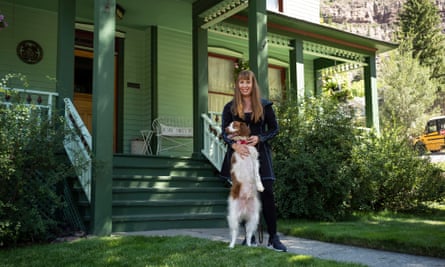
I put him back at the bottom. He jumped up on his back legs and hopped up the steps like he had been doing it his entire life. I didn't think it was true. Dexter has continued to walk on two legs since then. When he wants to go fast, he pops up on his two back legs to run, even though he uses his front left leg for balance.
The vet was concerned about the pressure on his hips. He stood up with his wheelchair still attached, which could have caused more harm. We didn't teach Dexter to walk this way. His back is strong and his hips are strong, according to his Chiropractor.
There is a seven-year-old boy named Dexter. The rules of what constitutes a physical impairment have been changed by him. He is the most joyful dog and he is determined. He is so proud of me. People writing to me say, "If Dexter can do it, so can I?" The clip of him was taken by a stranger and ended up on TV. He is happy with all the attention. At the end of the day, he is still our family pet, a dog who loves chasing balls, fetching sticks and running in the park. The vet said he must have had a will to live after the accident. Kentee Pasek is a person.
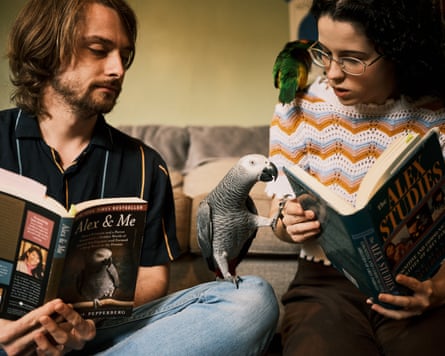
Apollo is on the verge of becoming the most intelligent bird in the world. He was purchased from a local pet store. He had been surrendered by his previous owner. They didn't want him anymore.
The space programme inspired us to name him Apollo. He was inquisitive and curious right away. He likes to learn and interact with us. We know how to get the best out of birds. We do everything we can to make him want to learn a new language.
Dr Pepperberg is a scientist who works with animals and particularly parrots. Alex, an African grey, who has a huge vocabulary, but has been raised in a lab, so is limited in how much progress he can make, inspired us. Alex is expected to be surpassed by Apollo at some point in the future.
Apollo said hello and "fresh water". It is possible that he is asking for a drink or a shower. He will either sip or hit the cup with his beak and say "pour water" for us to give him.
Apollo was able to get our attention by mimicking the sound of a message on social media. When the phone went off, he noticed we were on it. He has a lot of toys to play with. He likes shiny things that make noise.
There is a lot of snacking that Apollo wants. He knows he will get them as a reward and will say "earn a pistach" or " want a snack"
It has been difficult. For a long time Apollo experienced night terrors when we got him home after the pet store clipped his wings. He couldn't fly so he panicked a lot. We would put him under the blankets to calm him after a nightmare. It would reset him if he fell asleep. We wouldn't clip him ourselves.
He wakes us up before the sun rises. We hang out for an hour and he likes to practice his language skills with us. He eats lunch at noon and eats for an hour. He will pre-en his feathers after that. A lot of fresh vegetables are fed to him by us. He sleeps as soon as it's dark.
Apollo's language skills are almost new to us. He has a lot of potential. An African grey parrot can live up to 80 years. The most important years for humans are the formative years.
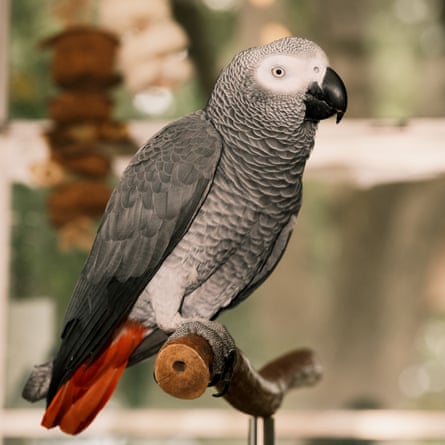
Apollo is a big fan of people. He wants to do something. He gets to interact with new people and learn new skills at the same time. We worked with a local university. Three days a week, students come to Apollo. The professor watched the videos of Apollo and was impressed.
Some people think that keeping a bird in the house is against nature. Apollo was raised in captivity as a child. He would most likely end up in the wilderness. The desire to stop breeding parrots is supported by us.
Teaching him is good. Apollo wants to communicate, he is wired to do that. He enjoys our sessions. It is a form of interaction. He watches us interact and learns. Apollo is an emotional animal that is worthy of a fulfilling life and you can't meet him.
Having the responsibility for Apollo and contributing to his language development is more important than any small annoyance. He's getting ready for puberty. He can split your ears with a shriek if he gets on your shoulder. Being responsible for something that you care about makes you happy. There are two people in this picture, Dalton Mason and Tori Lacey.
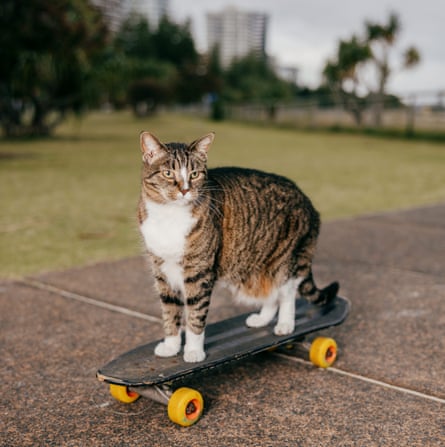
Didga is extraordinary. She is the most accomplished of my cats. She has a name that means "didgeridoo". There isn't a cat in the world that can do what she can do.
She was 12 weeks old when I adopted her. She has helped me teach other people how to get the best out of their cats as well.
Didga got into the Guinness World Records for performing 24 different tricks in under a minute. A high-five, a sideways roll, and a jump over a bar were included. Her trick is to jump up on to my hands and balance on them. Didga enjoys challenges.
I've been training animals for 40 years. I used to live in the US, train police dogs in the military, and work with animal actors before opening my own business.
I thought about getting a cat when I moved back to Australia, but I was told that cats can't be trained. I knew I could perform magic. People would be amazed at the amount of time it takes to teach a pet.
I began looking for kittens to adopt. A kitten caused a commotion as I walked through the shelter. We stopped to look over. She said she was trying to get your attention.
The kitten was in my possession. She enjoyed playing with other cats. She ate it out of my hand. She was put on her back by me. I adopted her and kept looking at her.
I trained Didga to swim with some dogs in the river. She did what she was told to do. I didn't force her to get into the water. She wanted to spend time with her dogs.
Didga knows a number of tricks that took a long time to learn. Cats have a small window before they want their food. I know how to break things down into baby steps. Didga likes to learn.
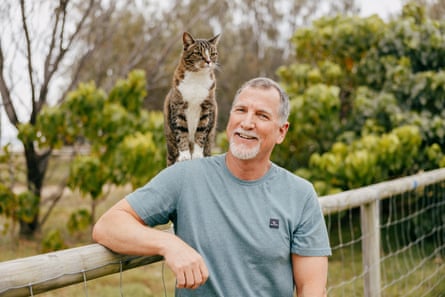
Skateboarding is one of her greatest achievements. She jumps on and over objects while riding the board. I have been trying to teach a trick to a cat for many years. They pick it up when they are patient and encouraged.
Training a cat is fascinating. I know how animals think and how they learn. If Didga doesn't like it, I go somewhere else.
I started Catmantoo to teach people how to have a better relationship with their cats by being patient, not having expectations and letting things happen at the cat's pace. Didga and I worked together to make other cats lives better. Cats are part of the family.
The cat is doing tricks that people are interested in. We get a lot of attention. People say they have seen everything when they see a skateboard cat. Most are positive. I wouldn't push a cat past its comfort zone if they didn't want it.
I have changed my life. She has taken me to new heights. The internet made things happen. My background, my love for animals, and my discovery of a very unique, special cat all came together. I won the lottery and found a cat. Robert Dollwet worked for the government.

I have been clean of drugs for a long time. I had a pet duck who was my only friend for a while. He was by my side when I crashed that night. We didn't have a stable living situation.
I had to find a new home for that duck when I was in recovery, and it made me want to let him go. When I get my life together, I will get another duck, and do it correctly. He will get the very best life.
I got sober because of that thought. I have been clean for 9 years. My sister helped me research which duck breed was the best pet and found it was a pekin. When we called the farm supplies store, we asked if they could let us know when they had any left.
They said some were about to hatch a few months later. It was about an hour and a half away, and I was excited because I knew I was doing it the right way. I was given a small duckling less than a day ago. He looked like a small brown ball. I was able to close my fingers around him because he fit in the palm of my hand. The connection was instantaneous.
The duck would have been raised on a farm. I think it would have been farmed to eat. The names we came up with with friends were laughed at. He is now known as his name. I like to use human names for animals. Our dogs are named Leonard and Frank. Ben is the only pet I have ever met.
We stumbled upon Ben's skills. The kit is put up all around the house by me. There is a drum in our hallway and I don't play much anymore. Ben kicks his feet when he is picked up. He enjoys it. He lets me know if he wants to go somewhere else.
Ben was making the perfect rhythm when my wife slipped the drum underneath him while he was kicking. The drum is soft and doesn't hurt him at all. I woke up the next day to find it had half a million views. Someone messaged me before I went to the gym saying they were talking about me on the radio. There was a lot of craziness from there.

Everything is done by Ben and me. We could either go to the park or to the river for a swim. He has come up with the idea that if we are in the car, we are going somewhere cool, and will make a noise when we get to the park. He passed out on the way back.
He has a large duck house. There is no reason to leave, other than to hang out with the dogs. There is a pool in that place. All his food. He'll be swimming all day. He is enjoying his life.
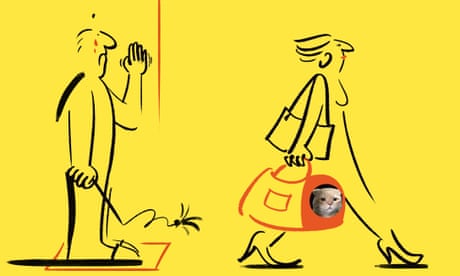
The dog is not being taken by you. Pet custody battles turned ugly.
Ben makes friends wherever he goes now that he's three years old. I use his fame to help people who are addicted to drugs. I share treatment or overdose prevention resources on his social media accounts. I talk about my experience to other people.
In February, I'll have been clean for nine years. I own a company that helps people get clean. 10 years ago, I would have thought my life was the same as it is today. A lot of the people we meet at recovery events are people I used to know.
I like to see how happy Ben makes people. He could be the difference between them and not. A duck can make a difference. He can inspire me and other people. There is a person namedDerek Johnson.